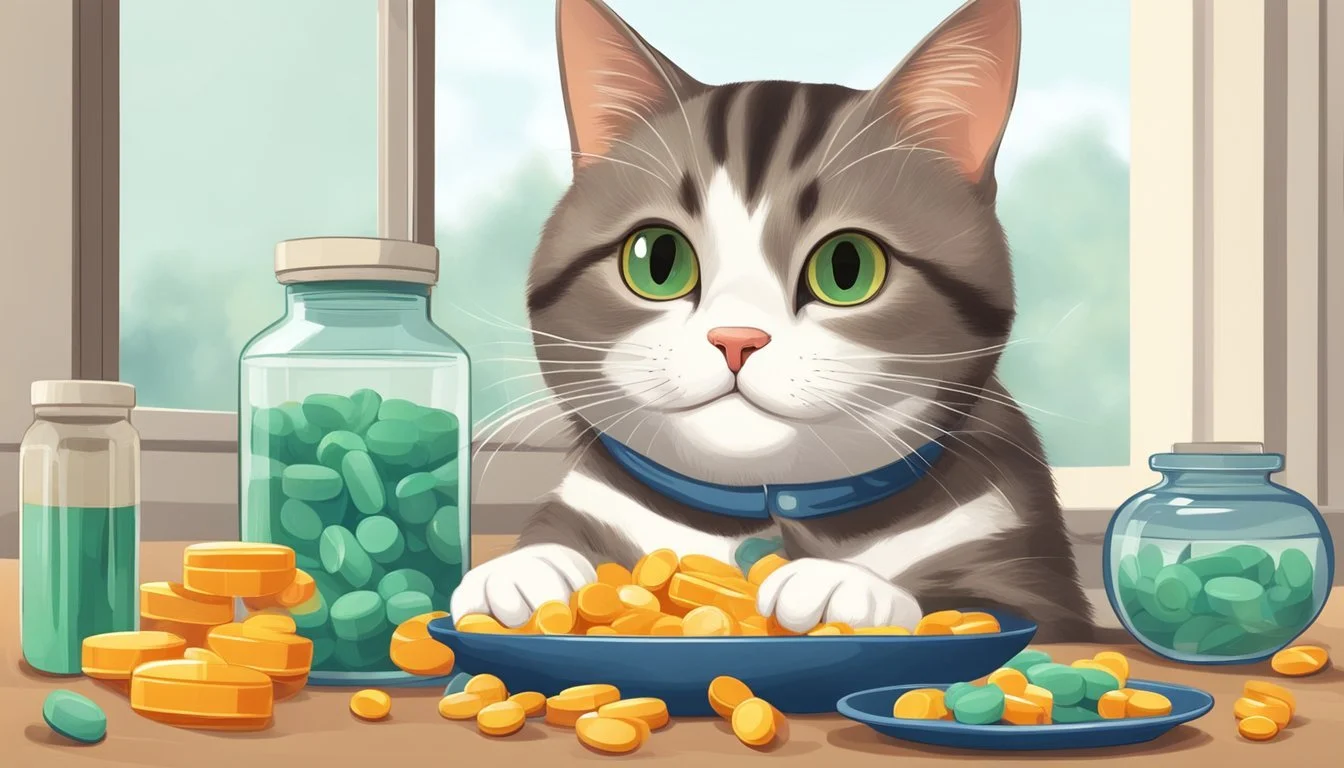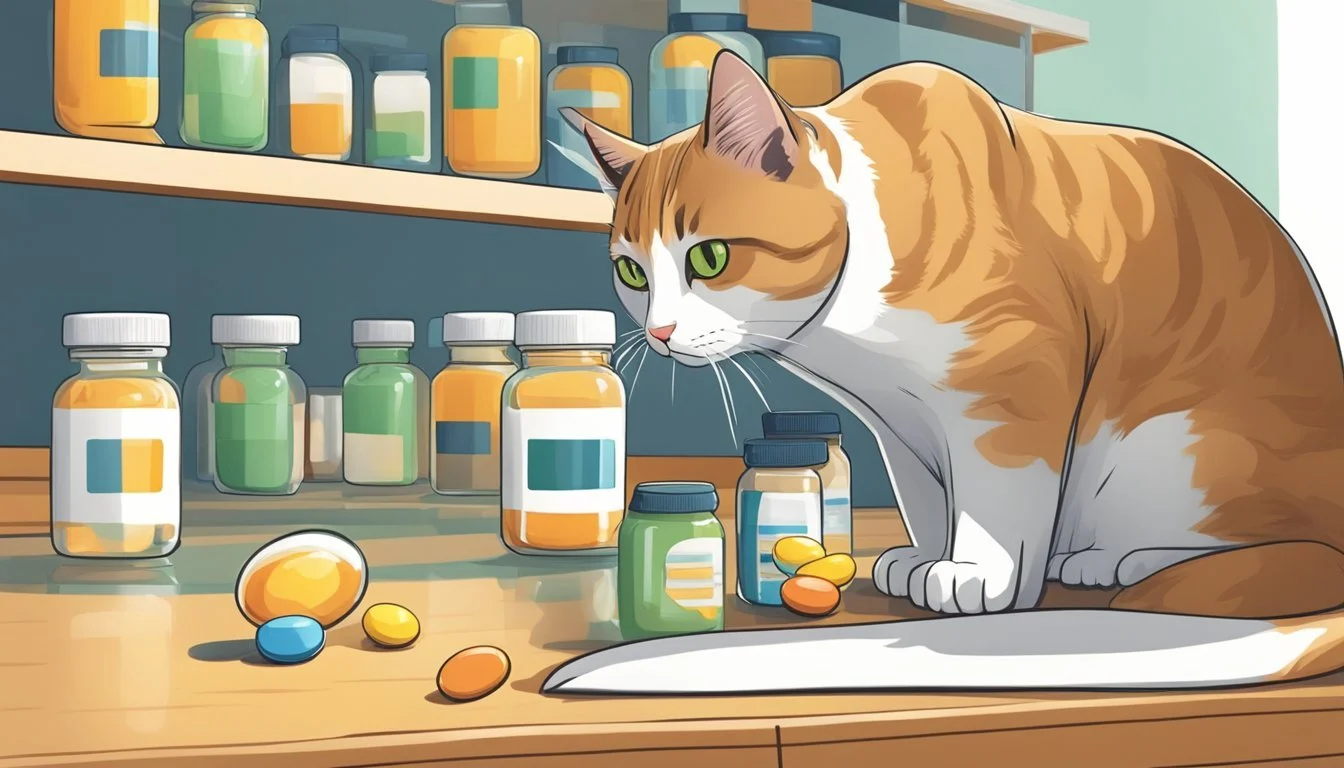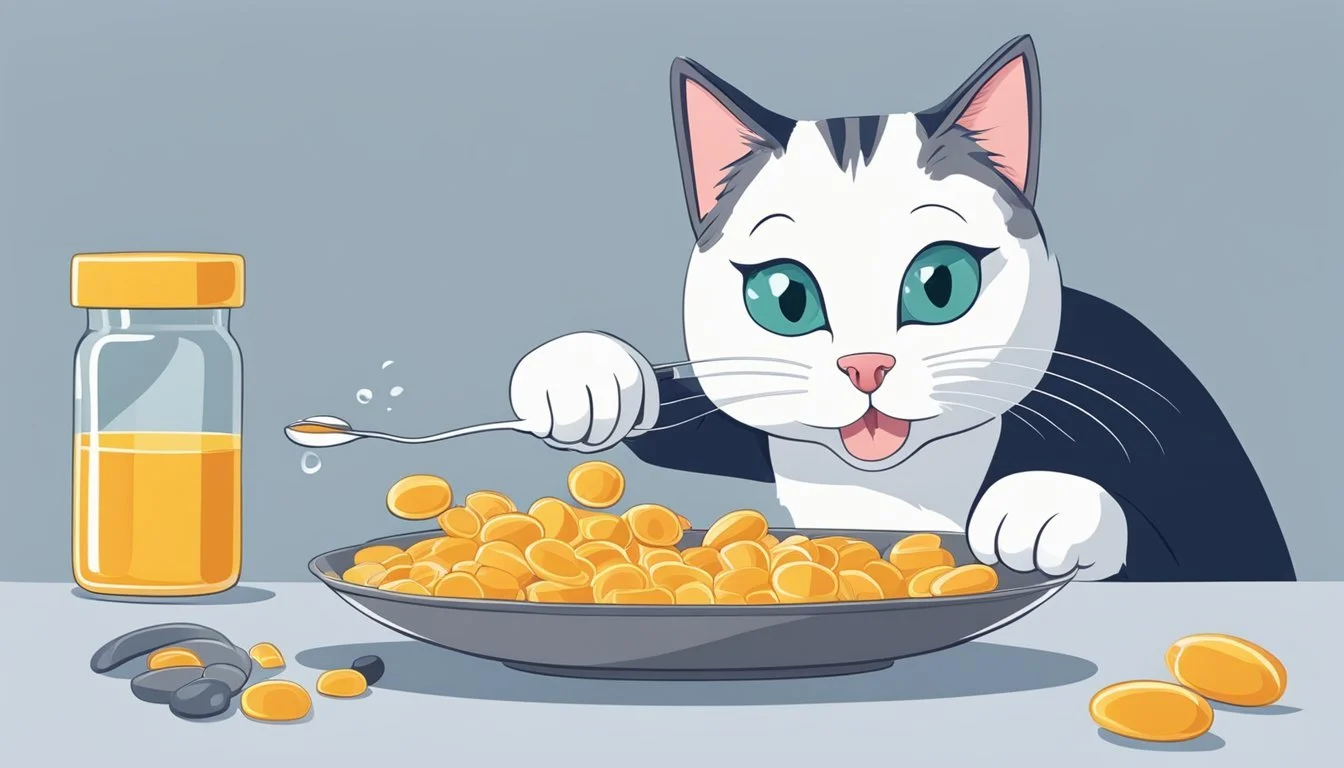Essential Vitamin Supplements for Cats: Boosting Feline Health
Cats require specific nutrients to maintain optimal health and vitality. While a balanced diet typically provides these essentials, some felines may benefit from vitamin supplements. The most common vitamins and supplements for cats include multivitamins, omega-3 fatty acids, vitamin C, and joint support formulas.
Multivitamins for cats often contain B-complex vitamins, vitamin D, vitamin E, vitamin A, and taurine. These supplements can be particularly beneficial for cats with dietary deficiencies or nutrient absorption issues. Omega-3 fatty acids, frequently sourced from fish oil, support skin, coat, and joint health.
Specialized supplements target specific health concerns in cats. Senior cats may require additional joint support, while others might benefit from immune-boosting formulas. It's important to note that supplements should complement, not replace, a nutritious diet. Consulting with a veterinarian is crucial to determine if a cat requires supplementation and which products are most appropriate for their individual needs.
Importance of Proper Nutrition in Cats
Proper nutrition is crucial for maintaining feline health and longevity. A balanced diet provides cats with essential nutrients needed for optimal bodily functions and disease prevention.
Essential Nutrients for Feline Health
Cats require specific nutrients to thrive. Protein is paramount, as cats are obligate carnivores. High-quality animal-based proteins supply essential amino acids like taurine, which supports heart and eye health.
Fats provide energy and help absorb fat-soluble vitamins. Omega-3 and omega-6 fatty acids promote skin, coat, and immune system health.
Vitamins and minerals play vital roles. Vitamin A supports vision and immune function. B vitamins aid in metabolism. Vitamin D strengthens bones and teeth. Zinc promotes skin health and wound healing.
Carbohydrates, while not essential, can provide energy. Water is crucial for hydration and overall health.
Understanding Cat Food Labels
Deciphering cat food labels is key to ensuring proper nutrition. Look for foods labeled "complete and balanced" to meet AAFCO standards.
Check the ingredient list. The first ingredient should be a high-quality protein source, such as chicken or fish.
Examine the guaranteed analysis section for minimum protein and fat percentages. Adult cats typically need 26-30% protein and 15-20% fat.
Be wary of excessive fillers or by-products. Opt for foods with named meat sources rather than generic "meat meal."
Consider life stage-specific formulas. Kittens, adults, and seniors have different nutritional needs.
Avoid foods with artificial preservatives, colors, or flavors. Natural preservatives like vitamin E are preferable.
The Role of Vitamins in Feline Wellness
Vitamins play a crucial role in maintaining a cat's health and vitality. These essential nutrients support various bodily functions, from bolstering the immune system to promoting healthy skin and coat.
Vitamin Types and Their Functions
Vitamin A supports vision, growth, and immune function in cats. It also helps maintain healthy skin and coat. Vitamin D is crucial for calcium absorption and bone health. Cats typically obtain it through their diet or sunlight exposure.
B vitamins, including B1, B6, and B12, are vital for energy metabolism and nerve function. Vitamin C, while produced naturally by cats, may be supplemented to support immune health in stressed or sick felines.
Vitamin E acts as an antioxidant, protecting cells from damage. It also supports skin health and immune function. Vitamin K is essential for blood clotting and bone metabolism in cats.
Signs of Vitamin Deficiencies
Vitamin A deficiency can lead to poor coat quality, night blindness, and increased susceptibility to infections. Cats lacking vitamin D may develop weak bones or dental issues.
B vitamin deficiencies can cause appetite loss, lethargy, and neurological problems. Insufficient vitamin E may result in muscle weakness and reproductive issues.
Signs of vitamin K deficiency include excessive bleeding or bruising. While rare, vitamin C deficiency might manifest as poor wound healing or weakened immune response.
Cats with dull coats, skin problems, or frequent infections may be experiencing vitamin deficiencies. Changes in appetite, weight loss, or unusual behavior can also indicate nutritional imbalances.
Supplementing Your Cat's Diet
Proper supplementation can enhance feline health when needed. Cats require specific nutrients, and supplements can address deficiencies or support certain conditions.
When Supplements Are Necessary
Supplements become necessary for cats in specific situations. Aging cats may benefit from joint support supplements. Cats with certain health conditions or nutritional deficiencies often require targeted supplementation. Indoor cats might need vitamin D supplements due to lack of sunlight exposure.
Veterinarians may recommend supplements for cats recovering from illness or surgery. Some cats with digestive issues can benefit from probiotics. Pregnant or nursing cats sometimes need additional nutrients to support their increased demands.
Always consult a veterinarian before starting any supplement regimen. They can assess your cat's individual needs and recommend appropriate supplements.
Choosing the Right Supplements
Selecting the right supplements for your cat is crucial. Look for products from reputable manufacturers with proper certification. Read labels carefully to ensure the supplement contains the specific nutrients your cat needs.
Consider the form of the supplement. Cats can be picky, so choose a format they'll accept. Options include chewable tablets, liquids, powders, and gels. Some cats prefer flavored supplements, while others may need unflavored versions mixed into food.
Avoid human supplements, as they may contain ingredients harmful to cats. Stick to products formulated specifically for felines. Pay attention to dosage instructions and follow them carefully.
Types of Supplements Available
Various supplements cater to different feline needs. Multivitamins for cats provide a broad spectrum of essential nutrients. These can be particularly useful for cats on homemade diets.
Omega-3 fatty acid supplements support skin, coat, and joint health. They're often derived from fish oil. Probiotics aid digestive health and can boost the immune system.
Taurine supplements are crucial for cats with deficiencies, as this amino acid is essential for heart and eye health. Glucosamine and chondroitin supplements support joint health in older cats or those with arthritis.
Vitamin B complex supplements can help cats with certain health conditions or those on restricted diets. Some cats benefit from calcium supplements, particularly those on homemade diets.
Special Considerations for Supplement Use
Supplement use for cats requires careful consideration of their individual needs and health status. Factors like age, existing conditions, and dietary requirements play crucial roles in determining appropriate supplementation.
Life Stage and Dietary Needs
Kittens often need different supplements than adult or senior cats. Growing kittens may benefit from calcium and vitamin D supplements to support bone development. Adult cats typically require fewer supplements if fed a balanced diet. Senior cats might need joint health supplements like glucosamine.
Pregnant or nursing cats have increased nutritional demands. They may need additional folic acid and iron. Indoor cats might require vitamin D supplements due to limited sun exposure. Always consult a vet before adding supplements to a cat's diet.
Managing Health Conditions with Supplements
Cats with specific health issues may benefit from targeted supplementation. Those with kidney disease often need phosphorus binders and omega-3 fatty acids. Cats with digestive problems might benefit from probiotics to support gut health.
Immune-compromised cats may need additional vitamins C and E. Cats with urinary tract issues could benefit from cranberry supplements for bladder health. Joint supplements can help cats with arthritis or mobility issues.
It's crucial to work with a veterinarian when using supplements to manage health conditions. They can recommend appropriate dosages and monitor for potential interactions with medications.
Administering Supplements to Your Cat
Proper administration of vitamin supplements is crucial for ensuring your cat receives the intended benefits. Accurate dosing and creative delivery methods can help overcome challenges with picky eaters.
Dosage and Frequency Guidelines
Always follow the dosage instructions provided by your veterinarian or on the product label. Most cat supplements are given daily, but some may require multiple doses per day. Measure liquid supplements carefully using the provided dropper or syringe. For tablets or capsules, use a pill cutter if needed to adjust the dose. Never exceed the recommended amount, as this can lead to health issues.
Timing matters too. Some supplements are best given with food, while others should be administered on an empty stomach. If giving multiple supplements, space them out to avoid interactions. Keep a consistent schedule to maintain steady levels in your cat's system.
Tips for Picky Eaters
Many cats are notoriously finicky, making supplement administration challenging. Try mixing powdered supplements into wet food or cat treats. Some cats prefer flavored supplements designed to taste like treats.
For tablets, consider using pill pockets or wrapping them in a small amount of cheese or meat. Crushing pills and mixing them with a small amount of tuna juice or low-sodium broth can also work.
If your cat refuses these methods, ask your vet about alternative formulations. Some supplements come as gels that can be applied to your cat's paw for them to lick off. Others are available as transdermal creams applied to the ear.
Patience and positive reinforcement are key. Never force supplements, as this can create negative associations and make future administration more difficult.
Monitoring Your Cat's Response to Supplements
Observing your cat's reaction to vitamin supplements is crucial for their health and well-being. Pay attention to changes in behavior, appetite, and energy levels after starting a new supplement regimen.
Look for improvements in coat quality and skin condition. A shinier coat and reduced skin flakiness can indicate positive effects on your cat's health.
Monitor your cat's digestive system. Watch for any changes in litter box habits or signs of gastrointestinal discomfort.
Keep track of your cat's weight and body condition. Sudden changes may signal an issue with the supplement or dosage.
Assess your cat's immune system function. A reduction in illness frequency or severity can indicate improved overall health.
Document any side effects or adverse reactions. Consult your veterinarian immediately if you notice vomiting, diarrhea, or unusual lethargy.
Regular check-ups with your vet are essential. They can perform blood tests to evaluate the supplement's impact on your cat's health.
Be patient when introducing new supplements. It may take several weeks to see noticeable improvements in your cat's condition.
Adjust dosages as needed, always under veterinary guidance. Cats' nutritional needs can change with age, weight, and health status.
Risks and Safety Concerns
While cat vitamin supplements can be beneficial, they come with potential risks. Understanding these concerns and taking proper precautions is essential for cat owners considering supplementation.
Interactions and Contraindications
Cat supplements can interact with medications or existing health conditions. Excessive vitamin A can lead to bone deformities and joint pain. Too much vitamin D may cause calcium deposits in organs.
Certain supplements might interfere with blood thinners or diabetes medications. Cats with kidney issues should avoid high levels of phosphorus and vitamin D.
It's crucial to consult a veterinarian before starting any supplement regimen. They can assess individual needs and potential risks based on the cat's health status and current medications.
Quality Control and Certification
Not all cat supplements are created equal. Some may contain inaccurate ingredient levels or contaminants due to poor manufacturing practices.
Look for products certified by the National Animal Supplement Council (NASC). This organization ensures quality control and proper labeling.
Choose supplements from reputable manufacturers with third-party testing. These companies often provide detailed information about their quality assurance processes.
Avoid products without clear ingredient lists or those making unrealistic health claims. Safety and efficacy should be backed by scientific evidence.
The Future of Cat Supplements
The cat supplement industry is poised for significant advancements in feline nutrition and veterinary care. Emerging trends in biotechnology and research are shaping new approaches to feline health.
Innovations in Feline Nutrition
Researchers are exploring targeted supplements that address specific health concerns in cats. Nanotechnology may enable more efficient nutrient delivery, enhancing absorption rates. Personalized supplements based on a cat's genetic profile could become available, tailoring nutritional support to individual needs.
Probiotics and prebiotics for gut health are gaining traction. Manufacturers are developing new formulations to support the feline microbiome. Novel protein sources and sustainable ingredients are being investigated to meet growing demand for eco-friendly options.
Functional treats with built-in supplements may offer a more appealing way to deliver nutrients. Smart packaging with dosage tracking could help pet owners maintain consistent supplement routines for their cats.
The Role of Veterinary Guidance
Veterinarians will play a crucial role in guiding supplement use as the market expands. Advanced diagnostic tools may allow for more precise nutrient deficiency detection, leading to tailored supplementation plans.
Continuing education for veterinarians on emerging supplement research will be essential. This knowledge will help them make informed recommendations to cat owners.
Telemedicine platforms could facilitate remote consultations for supplement advice. Digital health monitoring tools may provide real-time data on a cat's nutritional status, allowing for dynamic supplement adjustments.
Veterinary clinics may offer in-house supplement compounding services, creating custom blends for individual cats. Collaboration between veterinarians and supplement manufacturers could lead to evidence-based product development.
Conclusion
Vitamin supplements can play a beneficial role in feline health when used appropriately. Cats with specific nutritional deficiencies or health conditions may benefit from targeted supplementation. However, a balanced diet typically provides sufficient nutrients for most healthy cats.
Consulting a veterinarian is crucial before starting any supplement regimen. They can assess a cat's individual needs and recommend appropriate products. Quality and safety are paramount when selecting supplements for felines.
Multivitamins, omega-3 fatty acids, and probiotics are among the most common supplements for cats. These may support overall health, coat condition, and digestive function in some cases.
It's important to remember that supplements are not a substitute for proper nutrition and veterinary care. Regular check-ups and a high-quality diet tailored to a cat's life stage remain the foundation of feline health.
Responsible use of supplements, under professional guidance, can contribute to a cat's wellbeing. As research continues, our understanding of feline nutritional needs may evolve, potentially leading to more targeted and effective supplementation strategies.




